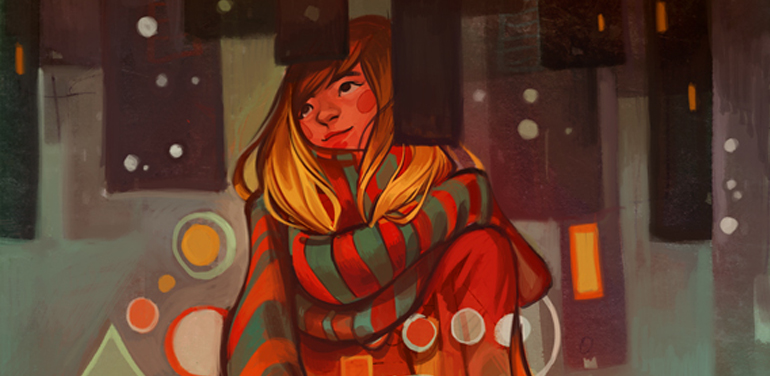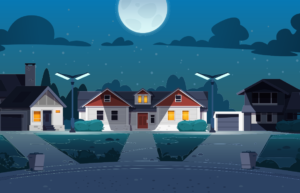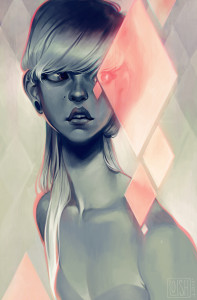Back home, my sister’s bedroom overlooked our back deck. She could climb out her windowsill and drop down a few feet onto the wooden planks below, landing on the balls of her feet so as not to give herself away. I couldn’t climb out my window – it faced the front, and neighbors would catch me trying to maneuver my way out and up onto the roof, the only place I could go. I liked to imagine having a rooftop outlook, a place where I could lay back and count the stars like the minutes of the night, ticking each one away. I’d have a warm nest of blankets to burrow into on the cooler nights. I’d have a mug of something hot to drink, some kind of tea. Maybe I’d have a telescope. Maybe I would’ve used it to catch sight of those comets that only come decades and generations apart, the ones they announce on the news the morning of to give people something to look forward to, something bright and shiny to take to the water cooler at work the next day. (“Did you catch Haley’s Comet last night?” “I did, wasn’t it spectacular?” “I’d never seen anything like it!”)
One evening, when the house was dark and I was filling a glass of water at the kitchen sink, I caught the sound of my sister’s window opening, the gentle whoosh like the gasp of a breeze, the creaking of her weight balanced on the edge of the sill, and the brief silence of her pause before she jumped down onto the deck, landing on soft feet that absorbed the impact through her soles. I never knew where my sister went when she journeyed into the unknown of the night, but it was the first time I was awake to witness the escape, and the desire to follow her was too strong to ignore. Emptying the just-filled glass in the sink, I pulled on a hooded sweatshirt, stuffed my feet into a pair of boots, and tracked after my sister.
A small wooded area rested in between our backyard and the cornfield that surrounded the farmlands we lived on the outskirts of. They were littered with deer ticks that our parents warned my sister and I away from, but I always found a way to risk the threat of a bite for the pleasure of exploration. There was an exciting sense of adventure that bubbled low in my belly whenever I looked through those trees, peering through the breaks in the branches and leaves and trying to catch small glimpses of those long, golden stalks, that brown, brittle carpet covered in crunchy straw that was so absurdly tempting to chew on. Our next door neighbor built a treehouse for their daughter when she was about ten, but when they moved away my sister took an unofficial residence. In the dark, with the moon hidden and the trees pushed together in large, shadowy clumps, it was easy to spot the dim, glowing square of light that indicated my sister’s location, and I made my way towards it.
Reaching the top of the ladder, I raised my hand to the underside of the hatch door – the words KEEP OUT spelled out in tiny, glow-in-the-dark stars – and slapped it soundly with my palm. The panelling jumped and slid away and Rachel’s face appeared, gravity pulling her red curls down over her ears. “What’s up?”
“‘What’s up?’ It’s the middle of the night and I’m clinging to a ladder in my pajamas. Can I come in?”
Without answering, her head disappeared as she moved away, and I climbed the rest of the way up, pulling myself over the hatch and sliding the door back into place. I scooted against the wall and pulled my arms inside my hoodie, holding myself tightly. “It’s a lot colder in here than I thought it would be.”
“It’s like forty degrees outside. Why did you think it’d be any better in here? I have yet to install the electric fireplace.” Despite her words, my sister was wearing only a long-sleeved shirt and a pair of boxer shorts. No socks. The candle that was burning on a small corner table gave off very little heat, but lit up the place pretty well. In the light, I could see my sister’s bare legs, pale and smooth, unmarred by trails of gooseflesh.
Feeling colder at just the sight of them, I pulled my hood up over my head, regretting not having dried my hair after my shower before venturing out here. “The door’s closed and there’s no open windows. Should keep the wind out.”
“Yeah, but I bet if you pulled that door back open again it wouldn’t change. This place seems to absorb the cold. Sinks right into the floorboards.”
I stared pointedly at her bare feet and deliberately moved my gaze up to her eyes. “You don’t seem too bothered by it.”
“I’m not.”
There was a large stack of construction paper in the center of the treehouse and Rachel took a seat next to it. It was then that I noticed the small pile of paper cranes not too far from where she sat, and I realized what my arrival had interrupted. “How many of those you gonna make?” The group of cranes, dressed mainly in solid, primary colors, looked to average about thirty.
“A thousand. That’s how the story goes, right? ‘The Thousand Paper Cranes.’” She picked up the next piece of paper on the stack – blue – and began folding it, smoothing out the creases with her flat hands.
“When you’re sick and dying, you make a thousand paper cranes. And you get people to help you out with it. You don’t make that many just for the hell of it. There something you’re not telling me?”
“I am dying. I’ll freeze to death in this box, surrounded by my pretty birds.” She finished the blue crane, adjusting its wings a bit before placing it with the others. Reaching for a green piece of paper, she threw a quick look my way, the corners of her mouth turned up just the slightest in playfulness. Rachel had an odd smile, one that didn’t wrinkle her eyes, or turn up her cheeks, but I was the only she ever gave it to, so I knew it was genuine.
I smiled back, one that pulled the muscles at the corners of my lips, and leaned forward to snag an piece of orange construction paper. “Then we best make haste if we want to finish these before you kick it. What’ve we got, like, five-hundred to go? Should I begin the preparations for your funeral now?”
“You’re so weird?” she remarked, but she laughed and shook her head, adding the recently finished green crane to the completed pile. “And you don’t even know how to make them. You won’t be any help.”
“How do you know?” I asked, trying to cover up the corner I had accidentally squashed.
“Because this construction paper is too big to make the normal-sized origami crane. Each one has to have about a half inch stripped off first before you start folding.” To illustrate her point, she took another piece of paper (red), folded down a small section, and licked along the crease like it were the back an envelope. “You want to dampen the edge so it’s easier to tear off,” she explained, before doing just that.
“Oh.” I looked down at my sad attempt and tossed it into the pile, the slight movement disturbing the perfectly structured cranes from their restful place. “Well, you’re on your own then. Guess you’ll have to make a thousand and one to make up for mine.”
“Guess so,” Rachel responded, but she didn’t sound bothered or annoyed by the request. She continued with her paper folding, and as the chill set in, I pulled my hoodie over my tucked-up knees and watched her silently.
___
The featured image accompanying this piece, entitled ‘Frozen Lemons’, has been used with the permission of artist Lois Van Baarle.







